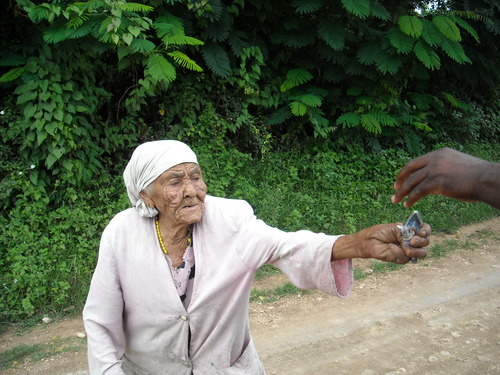“Give Me One Dollar”

For years I heard my son, Clint, a soldier in the 173rd Airborne, speak of “collateral damage.” I cringed every time he said the phrase, knowing he used the words to describe an unintended consequence of an armed intervention. In plain speak, though it was not planned, innocent people lost their lives.
Reading Zygmunt Bauman’s Collateral Damage: Social Inequalities in a Global Age, I began to think of collateral damage outside of military terminology. In fact, as I sat in Uganda, the phrase rang close to my heart, as I saw the vast difference between this African culture and the place I call home, Haiti.
After the 2010 earthquake, Haiti received millions upon millions of dollars of aid. NGO’s private donors, and big organizations, descended upon Haiti as individuals with no plans or coordination for rebuilding or sustainability. Money flowed in to the wrong hands, and the common people never saw the money. The poor became poorer, the rich became richer, and the poor came to depend on everyone and anyone for help. Though NGO’s were there to meet an immediate need, they left a lingering problem. Leaders failed to see past the disaster recovery stage, and months later when cholera devastated the already struggling country, local leaders were not prepared to respond to the damage of their communities and neighbors.
Bauman’s discussion of Hurricane Katrina provides an excellent example of what he termed a natural disaster with very unnatural unequivocal human consequences. The collateral damage left in Haiti is quite different than that of military engagement; instead the damage left is a culture of dependency. Massive amounts of aid entered the country to help the poor and oppressed, but the money turned into collateral damage when it did not go where it needed to go.
Now, four years after the massive earthquake, the first words I hear when walking into a meeting, taking a stroll through a village or stepping out of a car are, “Give me one dollar.” Though their spoken language is Creole, these words exit mouths in perfect English. The children see an American, and immediately they put their hand out. The donation or money is not a gift; it is now expected. However, it is not only the children; the adults do the same. In fact, on my most recent trip to Haiti, a group of leaders from an adjacent community came to our work site. They asked me to come to their village, and while I was leery to do so, I nevertheless accepted their invitation. I walked to their community, and there, in the middle of the road, they asked me what I was going to give them. I was bewildered. I did not even know their names, let alone what community I was standing in or who they were. We sat and talked awhile longer, and the pastor looked at me and said, “I could not let you leave without at least asking you for money. It is my obligation to do so.”
In trying to be kind and giving to communities in need, and in our efforts to help, we have instead taught dependency. As my fellow cohort-mate said, the Haitians never learn to take care of anything, never learning responsibility or the value of obtaining things through one’s efforts. It is creating a dependency and destroying all motivation to do.
In this global age our “liquid”, tangible solution to every problem is money. If only we would take the time to get to know the people we want to “help,” we would know their real needs and what they actually want. Perhaps this would minimize the collateral damage.
Reference:
Bauman, Zygmunt. Collateral Damage: Social Inequalities in a Global Age Cambridge, UK: Polity Press, 2011.
Leave a Reply
You must be logged in to post a comment.